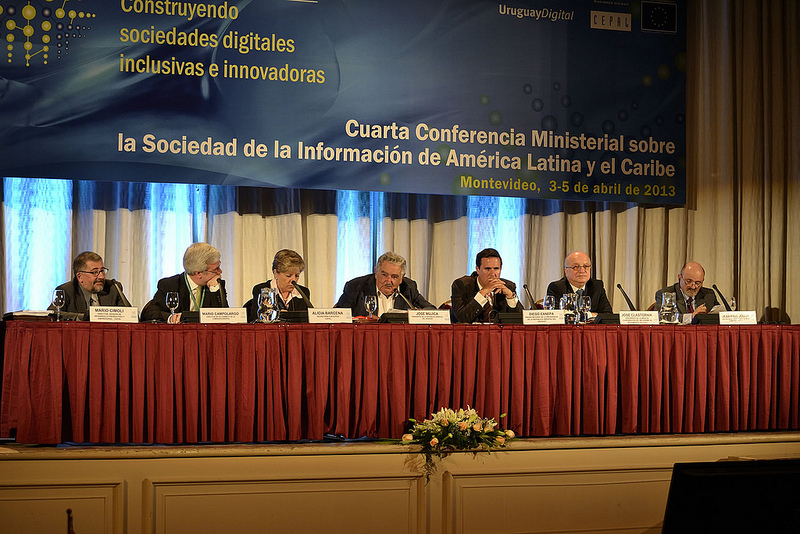Region's Countries Reaffirm Their Commitment to Cooperate on the Information Society
Representatives from 15 of the region's countries signed the Montevideo Declaration at the Fourth Conference on the Information Society in Latin America and the Caribbean.

Watch video: Dialogue for the information society Latin America - Europe
(5 April 2013) In the Montevideo Declaration signed today at the close of the Fourth Ministerial Conference on the Information Society in Latin America and the Caribbean, the region's countries reaffirmed their commitment to continue making progress towards achieving the targets set out in the Plan of Action for the Knowledge and Information Society in Latin America and the Caribbean, eLAC2015, and their clear determination to strengthen regional collaboration in this sphere.
In her closing speech, Executive Secretary of the Economic Commission for Latin America and the Caribbean (ECLAC), Alicia Bárcena, highlighted the need for information and communication technology (ICT) policies to be long term and, like eLAC, to have a State dimension. She described these as public policies, not State ones. Their design and implementation involve many stakeholders: civil society, businesses, governments and universities.
The Montevideo Declaration was signed in the Uruguayan capital by representatives of Argentina, Brazil, Chile, Colombia, Costa Rica, Cuba, Dominican Republic, Ecuador, El Salvador, Guatemala, Mexico, Panama, Paraguay, Peru, and Uruguay, who took part in the Ministerial Conference that was opened on Wednesday and closed on Friday.
Countries also underscored the importance of expanding the digital economy as a key part of productive transformation, as well as the need to have more in-depth policies for structural change that would make it possible to incorporate more knowledge and innovation in production activities, while promoting sustainable growth with social equality.
Similarly, Latin American and Caribbean countries also resolved to "reject any attempt to appropriate, without the due consent of the region's countries, the names Amazonia and Patagonia in any language, as well as any other top level domains (gTLD) referring to geographical, historical, cultural or natural names, which must be preserved as part of their cultural identity and heritage".
Ms. Bárcena seconded this and stated "our countries' position on this shows the importance of the eLAC mechanism in protecting national and regional public interests in such matters".
Countries also agreed to continue strengthening existing cooperation with stakeholders outside the region and recognized ECLAC's work as technical secretariat of eLAC and its importance for the continuity of the process. They also acknowledged the assistance of the European Commission to the eLAC process form the outset and called upon the Commission to continue its political and strategic cooperation with the region.
The invaluable European cooperation was highlighted too by the Executive Secretary of ECLAC, who described it as indispensible. Alicia Bárcena also took the opportunity to welcome the Regional Dialogue on Broadband to Mexico, and to thank the country's offer to host the next Ministerial Conference to be held in 2015.
According to the Executive Secretary "In 10 years, governments, administrations and situations have changed - but the efforts and commitment remain the same. Today we are on the path towards the goals of eLAC2015, and the continuity of our efforts is ensured".
Mario Campolargo, Director of the European Commission's DG CONNECT.E, said he appreciated the work of ECLAC in this sphere and that he was confident that the achievements of the past decade can be carried forward with the same level of success, while also stressing Europe's interest in continuing to strengthen cooperation with Latin American and Caribbean countries.
Luis Almagro, Foreign Affairs Minister of Uruguay, declared that "this meeting represented a step forward", and said that 2015 will see a convergence of various national and international agendas, such as the eLAC Regional Plan of Action, The World Summit on the Information Society and the Millennium Development Goals - which challenges the region and the international community to respond to the commitments undertaken.
Chair of the Presiding Officers of eLAC2015, José Clastornik, stated that "We are convinced of the importance of regional coordination for the information society", and he emphasized the need to continue working actively to maintain all the achievements in the future.
The closing session also featured the Deputy Secretary of the Presidency of Uruguay, Diego Cánepa, ECLAC Officer-in-Charge of the Secretariat of the Commission, Luis F. Yáñez, and Director of the ECLAC Production, Productivity and Management Division, Mario Cimoli.
As well as country representatives, the meeting was attended by four observer agencies to the eLAC process (ALETI, APC, AHCIET and LACNIC), 10 United Nations agencies, 10 intergovernmental organizations, 13 non-governmental organizations, representatives from the European Commission, Japan, Republic of Korea and Turks and Caicos islands, plus over 500 participants.
The Fourth Ministerial Conference on the Information Society in Latin America and the Caribbean was organized by ECLAC through the ECLAC @LIS2 project - jointly financed by the European Commission - and the Government of Uruguay, through the Agency for Electronic Government and the Information Society (AGESIC).
See also:
Any queries should be sent to the ECLAC Public Information and Web Services Section.
E-mail: prensa@cepal.org; Telephone: (56 2) 2210 2040.
Follow us on: Twitter, Facebook, Flickr and YouTube.
Related content
Cierre de la cuarta Conferencia Ministerial sobre la Sociedad de la Información de América Latina y el Caribe
Por Alicia Bárcena, Secretaria Ejecutiva de la CEPAL
Country(ies)
- Latin America and the Caribbean
- Uruguay
